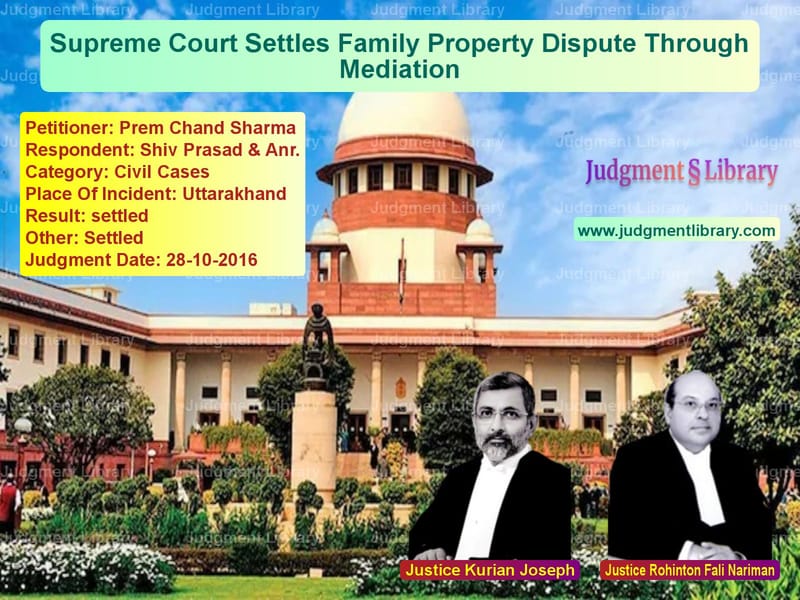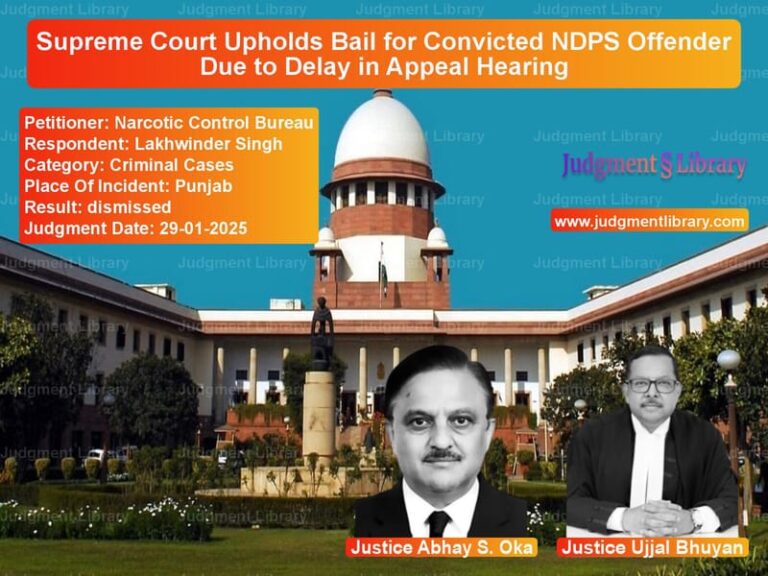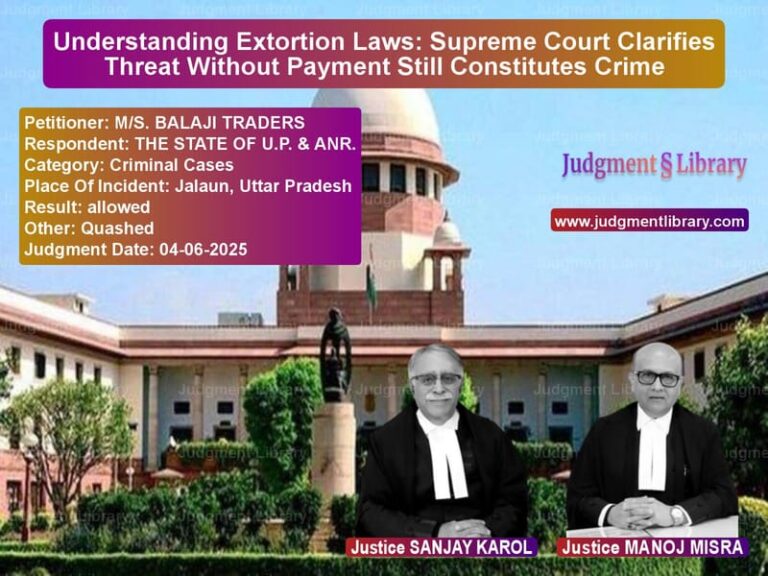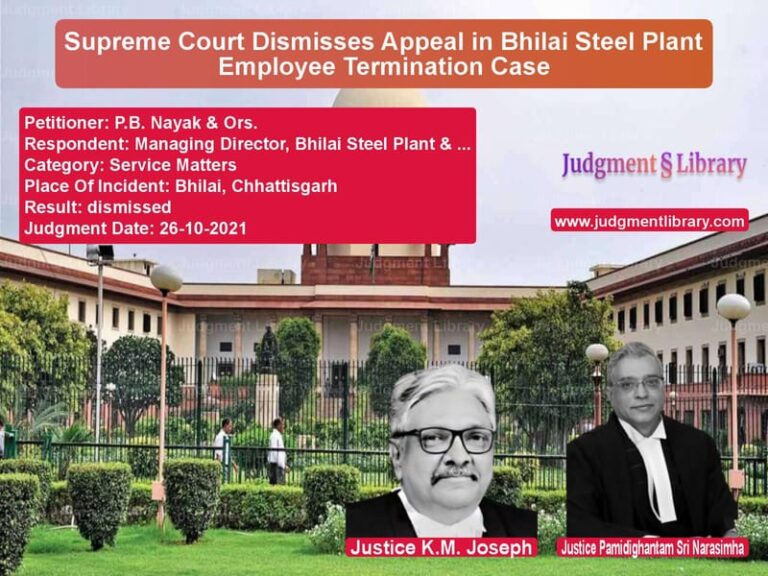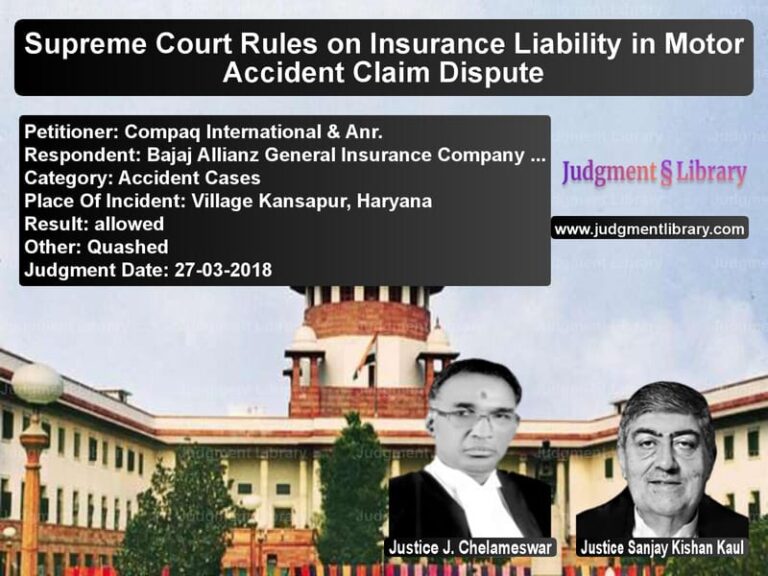Supreme Court Settles Family Property Dispute Through Mediation
The case of Prem Chand Sharma vs. Shiv Prasad & Anr. is a landmark example of dispute resolution through mediation in family property disputes. The Supreme Court of India successfully facilitated an amicable settlement between two real brothers, ensuring a fair and peaceful resolution. This judgment highlights the judiciary’s role in encouraging alternative dispute resolution mechanisms such as mediation.
Background of the Case
The dispute arose between two real brothers, Prem Chand Sharma (the appellant) and Shiv Prasad (the respondent), over property matters. The litigation had reached the High Court of Uttarakhand at Nainital as First Appeal No. 62 of 2012. Dissatisfied with the proceedings, the appellant approached the Supreme Court, filing a civil appeal (SLP (C) No. 4254 of 2016).
Recognizing the familial nature of the dispute, the Supreme Court, at the time of issuing notice, suggested that the parties explore the possibility of an amicable settlement. Subsequently, the case was referred to the Supreme Court Mediation Centre, where both parties successfully resolved their differences through mediation.
Legal Issues Raised
- Whether family property disputes should be resolved through mediation instead of prolonged litigation.
- Whether the Supreme Court can direct mediation as a preferred mode of dispute resolution.
- Whether a settlement agreement reached through mediation is legally binding.
Arguments by the Parties
Arguments by the Appellant (Prem Chand Sharma)
- The prolonged litigation was causing financial and emotional distress to both parties.
- As the dispute was between two real brothers, mediation was a suitable alternative to judicial determination.
- The parties were willing to find a fair and mutually acceptable solution.
Arguments by the Respondents (Shiv Prasad & Anr.)
- The respondents were open to mediation but wanted assurances regarding the enforceability of the settlement.
- They requested that the Supreme Court formally recognize and approve the mediation agreement.
- They sought a resolution that protected the interests of all involved family members.
Supreme Court’s Observations
The Supreme Court appreciated the willingness of both parties to resolve their dispute amicably and made the following key observations:
- Mediation is a preferred mode of dispute resolution in family matters, particularly in cases involving siblings and property disputes.
- The Settlement Agreement dated 12.05.2016, signed at the Supreme Court Mediation Centre, was legally binding and enforceable.
- The Court expressed appreciation for the efforts taken by the mediator, Shri K.D. Singh, and acknowledged the cooperation of the parties and their counsel.
- Given the successful mediation, there was no need for further judicial intervention.
Final Judgment
The Supreme Court disposed of the appeal with the following directives:
- The appeal was disposed of in terms of the Settlement Agreement dated 12.05.2016.
- The pending First Appeal No. 62 of 2012 before the High Court of Uttarakhand at Nainital was also disposed of.
- The Registry was directed to communicate a copy of the judgment to the High Court.
Analysis of the Judgment
Encouraging Mediation in Family Disputes
The Supreme Court’s ruling reinforces the importance of mediation in family disputes. Litigation often strains familial relationships, whereas mediation allows parties to reach a solution amicably while preserving relationships.
Judicial Endorsement of Mediation
By formally approving the Settlement Agreement, the Supreme Court has strengthened the legal standing of mediation agreements. This ruling encourages parties to opt for mediation before resorting to prolonged litigation.
Legal Enforceability of Mediation Settlements
The Court’s directive that the agreement be binding ensures that mediated settlements are not merely advisory but have the force of law, preventing future disputes over the same matter.
Implications of the Judgment
For Families in Legal Disputes
- Encourages family members to resolve disputes through mediation instead of lengthy court battles.
- Promotes amicable resolutions that preserve relationships.
- Ensures that mediation agreements are enforceable in courts.
For the Legal System
- Reduces the burden on courts by resolving disputes outside the judicial process.
- Sets a precedent for referring family disputes to mediation before formal litigation.
- Encourages the use of Supreme Court Mediation Centres and other similar institutions.
For Alternative Dispute Resolution (ADR)
- Strengthens the credibility of mediation as a viable dispute resolution mechanism.
- Encourages more parties to consider mediation as a first step in dispute resolution.
- Reinforces the enforceability of mediation agreements, ensuring compliance.
Conclusion
The Supreme Court’s decision in Prem Chand Sharma vs. Shiv Prasad & Anr. highlights the growing importance of mediation in resolving family property disputes. By facilitating an amicable settlement and legally recognizing the agreement, the Court has set an important precedent for future cases. This judgment not only benefits the parties involved but also paves the way for increased use of alternative dispute resolution in India.
Don’t miss out on the full details! Download the complete judgment in PDF format below and gain valuable insights instantly!
Download Judgment: Prem Chand Sharma vs Shiv Prasad & Anr. Supreme Court of India Judgment Dated 28-10-2016.pdf
Direct Downlaod Judgment: Direct downlaod this Judgment
See all petitions in Property Disputes
See all petitions in Dispute Resolution Mechanisms
See all petitions in Specific Performance
See all petitions in Judgment by Kurian Joseph
See all petitions in Judgment by Rohinton Fali Nariman
See all petitions in settled
See all petitions in settled
See all petitions in supreme court of India judgments October 2016
See all petitions in 2016 judgments
See all posts in Civil Cases Category
See all allowed petitions in Civil Cases Category
See all Dismissed petitions in Civil Cases Category
See all partially allowed petitions in Civil Cases Category

